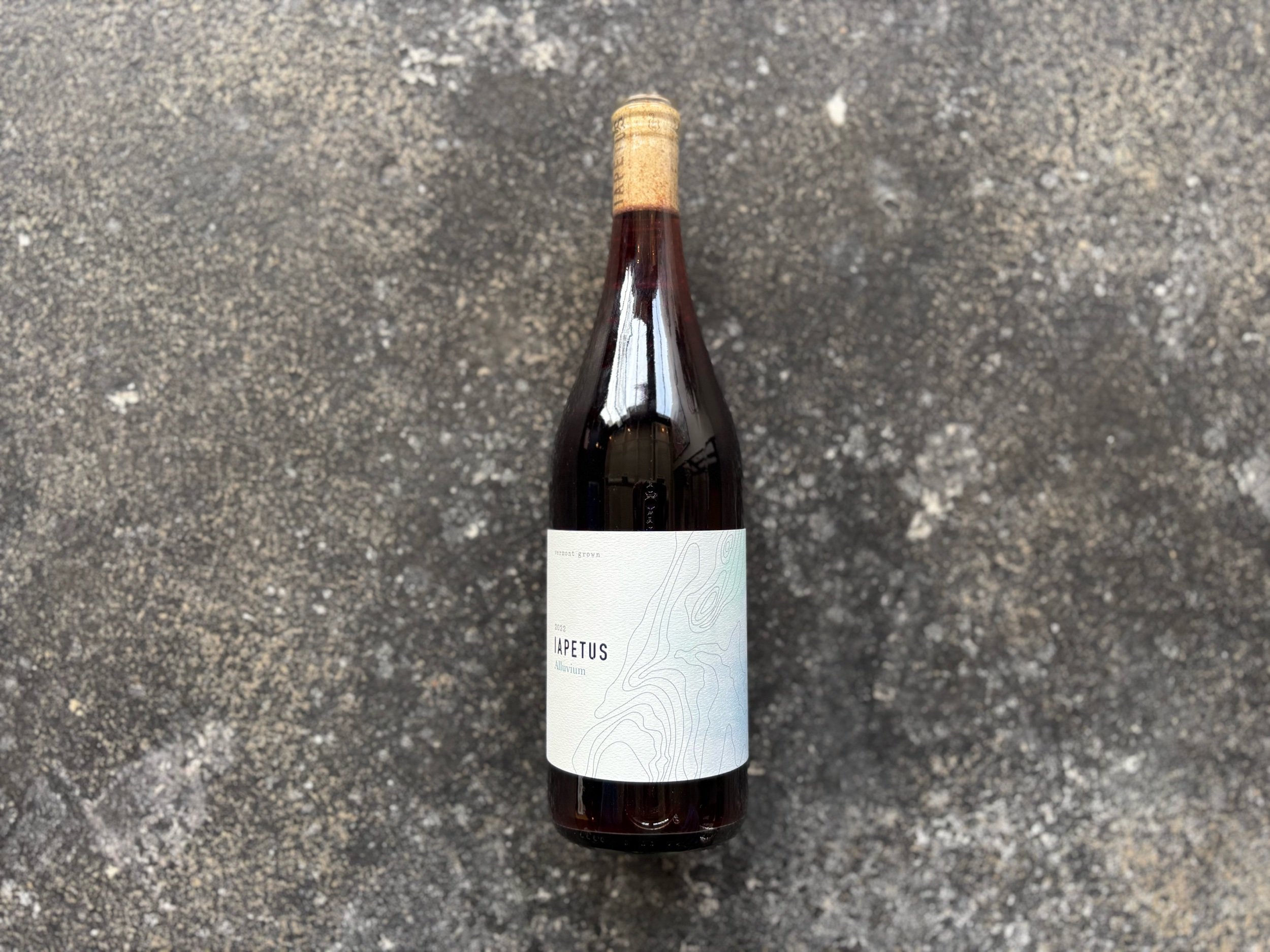Iapetus ‘Alluvium’ Rosé 2022
Location: United States, Vermont
Winemaker: Ethan Joseph
Grapes: Petite Pearl, Marquette, St. Croix, Piquette
Soil: sandy loam
Winemaking: This new addition to our Iapetus family is a spontaneously-fermented, unfiltered and unfined rosé composed primarily of our Petite Pearl and Marquette grapes. After direct pressing, they were fermented separately for two weeks before being combined to finish fermentation together. Lees stirring occurred every few days for several weeks, and the wine completed spontaneous malolactic fermentation.
From the Producer: ‘Alluvium’ has notes of deep red berry, and a touch of tropical fruit. This bright and light rose has a hint of tannin, and is almost reminiscent of white tea on the palate. The color is darker than a usual rose, due to the red-flesh of the grapes.
Iapetus is more than the name of an ancient ocean that once covered the present-day Champlain Valley. As a concept, it is the beginning of a story hundreds of millions of years old. It is as much about the past as it is about the future. Just as geology induces transition over time, Iapetus will serve as an evolution for us as winegrowers in how we pursue our working relationship with wine. It is a shifting of time, of scale, and way of thinking. We are not dogmatic in our principals, but rather endeavor to continually experiment, discover, and improve our stewardship of this storied land. In this way, Iapetus is just a slide in this continuous film, a photograph of a moment now and in the years to come. Iapetus is wine.
Location: United States, Vermont
Winemaker: Ethan Joseph
Grapes: Petite Pearl, Marquette, St. Croix, Piquette
Soil: sandy loam
Winemaking: This new addition to our Iapetus family is a spontaneously-fermented, unfiltered and unfined rosé composed primarily of our Petite Pearl and Marquette grapes. After direct pressing, they were fermented separately for two weeks before being combined to finish fermentation together. Lees stirring occurred every few days for several weeks, and the wine completed spontaneous malolactic fermentation.
From the Producer: ‘Alluvium’ has notes of deep red berry, and a touch of tropical fruit. This bright and light rose has a hint of tannin, and is almost reminiscent of white tea on the palate. The color is darker than a usual rose, due to the red-flesh of the grapes.
Iapetus is more than the name of an ancient ocean that once covered the present-day Champlain Valley. As a concept, it is the beginning of a story hundreds of millions of years old. It is as much about the past as it is about the future. Just as geology induces transition over time, Iapetus will serve as an evolution for us as winegrowers in how we pursue our working relationship with wine. It is a shifting of time, of scale, and way of thinking. We are not dogmatic in our principals, but rather endeavor to continually experiment, discover, and improve our stewardship of this storied land. In this way, Iapetus is just a slide in this continuous film, a photograph of a moment now and in the years to come. Iapetus is wine.
Location: United States, Vermont
Winemaker: Ethan Joseph
Grapes: Petite Pearl, Marquette, St. Croix, Piquette
Soil: sandy loam
Winemaking: This new addition to our Iapetus family is a spontaneously-fermented, unfiltered and unfined rosé composed primarily of our Petite Pearl and Marquette grapes. After direct pressing, they were fermented separately for two weeks before being combined to finish fermentation together. Lees stirring occurred every few days for several weeks, and the wine completed spontaneous malolactic fermentation.
From the Producer: ‘Alluvium’ has notes of deep red berry, and a touch of tropical fruit. This bright and light rose has a hint of tannin, and is almost reminiscent of white tea on the palate. The color is darker than a usual rose, due to the red-flesh of the grapes.
Iapetus is more than the name of an ancient ocean that once covered the present-day Champlain Valley. As a concept, it is the beginning of a story hundreds of millions of years old. It is as much about the past as it is about the future. Just as geology induces transition over time, Iapetus will serve as an evolution for us as winegrowers in how we pursue our working relationship with wine. It is a shifting of time, of scale, and way of thinking. We are not dogmatic in our principals, but rather endeavor to continually experiment, discover, and improve our stewardship of this storied land. In this way, Iapetus is just a slide in this continuous film, a photograph of a moment now and in the years to come. Iapetus is wine.

